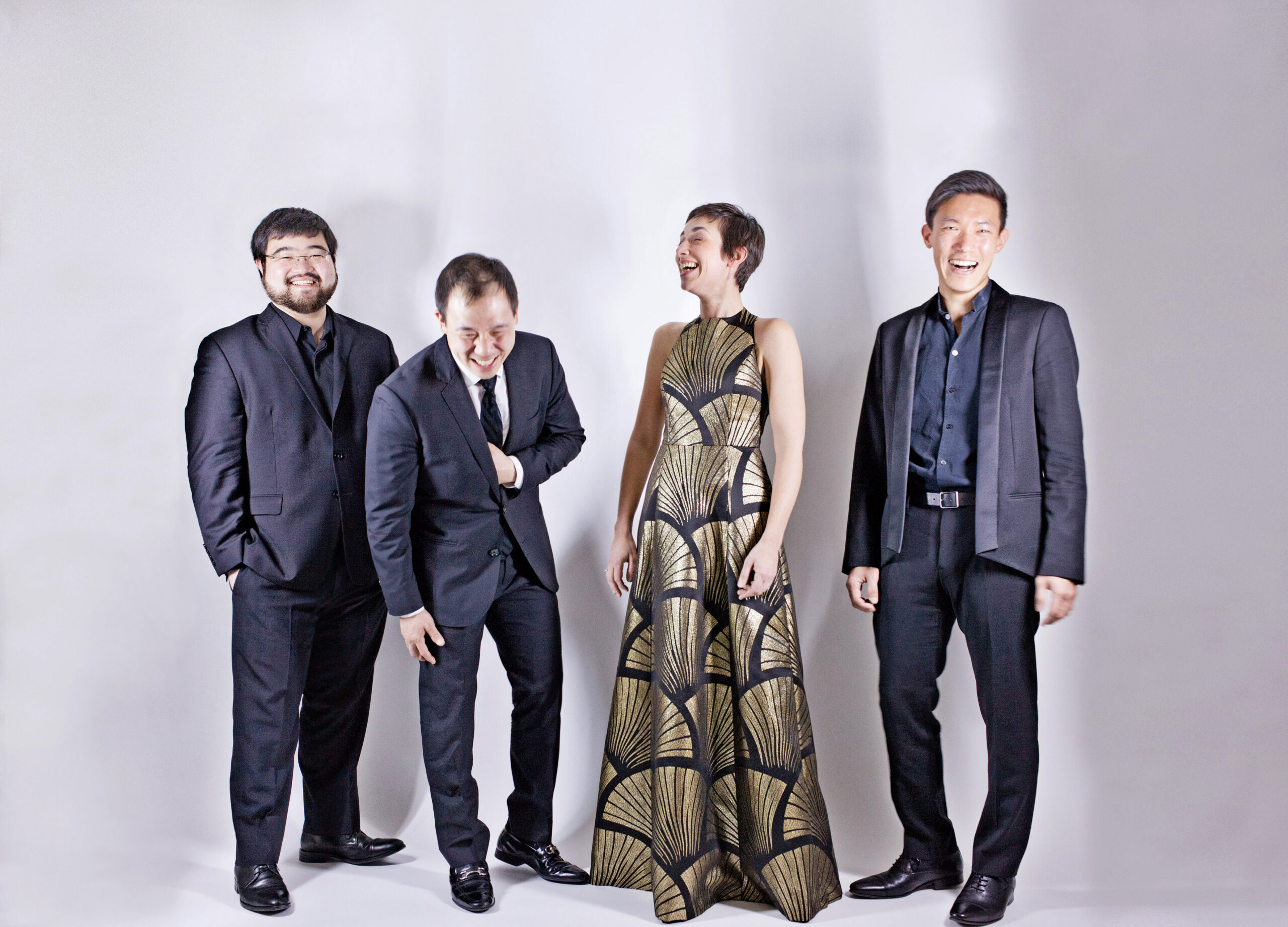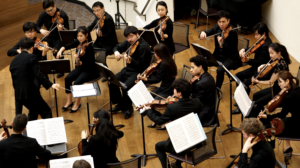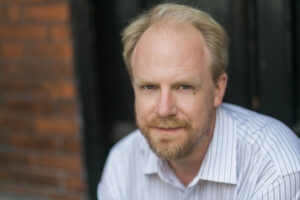On Thursday evening in New York, Momenta Quartet’s October festival – now nine years running – closed with an assorted program, enthusiastically curated by violist/composer Stephanie Griffin. Griffin is the last founding member still actively performing with the group. Noting that this festival has ever featured the opportunity for each member to have curatorial carte blanche on one night only, Griffin nodded to the overall 2024 theme – Charles Ives at 150 – while admitting that “this is not a thematic program, but rather a joyous collection of pieces that I saw fit to celebrate the genius of Charles Ives and my own twenty years as the violist of Momenta.” As such, her own instalment was themed Momenta at 20. Griffin’s rather fine and comprehensive program notes are recommended ancillary reading, and can be found HERE.
The first musical offering was from Mexican composer Julián Carrillo: his String Quartet No. 3 “Dos Bosquejos.” Opening with muted strings and an effective microtonal chorale, this music veiled itself in mystery, dark and lush, a perfect selection with which to begin the evening. The piece continued to unfold like a set of exercises – or experiments – in string writing, with novel techniques (ca. 1927!) and textural effects. The first movement, “Meditación,” eventually burst a romantic vein, with solos and extended techniques eliciting vaguely integrated call-and-answers.
The second movement, “En Secreto,” felt eerily expressionist. (Griffin likens Carrillos’ music “to the work of surrealist artists such as Salvador Dalí and René Magritte.”) While related in mood and material to the first, the “secrets” revealed in this second and final movement were whispered between instruments in a matter-of-fact, straightforward mode, a little too efficiently.
Momenta seemed to relish these coloristic experiments in extended space. Carrillo’s numerous homophonic passages prove especially demanding in their intonation and yet most octave unisons were handled judiciously by this group. Suddenly, just as this essaying music began to fatigue under its own weight, it was over: a mere eleven minutes in duration.
After this, Stephanie Griffin spoke to the audience about the quartet’s close relationship with the music of Carrillo. They “fell in love” with the string writing of this composer and have established an important connection with his unduly neglected catalogue. Griffin has proclaimed* the forthcoming recording of Carrillo’s complete string quartets on the Naxos label to be Momenta’s “most significant legacy.”
The remainder of the first half highlighted early music from Charles Ives. Brief and inconsequential, The Innate (1908) for string quintet and piano, is based on hymnal material. It stood out as a somewhat unquantifiable preamble to the composer’s early quartet – the Quartet No. 1 (1896-1902) – which has been a favorite of Momenta’s, as Griffin explained in her spoken introduction. It was a part of their first season in 2004-2005, twenty years ago.
This first quartet from the turn of the century is a high-energy, Ivesian romp in three movements, containing a great deal of musical irony: an irony sometimes missed by Momenta on Thursday night. Striking the right side of Ives’ mercurial nature can challenging, particularly in his earlier works. There exists a quirky dimensionality here, even in seemingly upfront and “folksy” material. During Thursday’s performance, a command of tempi and rhythm in the first movement could have been better established.
The rhetorical components of the first and second movements urge a singular vision of interpretation. This brave new music, (as it was in its own time), remains theatrical today. For Momenta, the blending and balance amongst the four instruments went astray at times, requiring more central grounding in the hopes of evoking a sense of play. Where was the element of surprise?
Conversely, the third movement read as well integrated and convincing. The individualistic approach from each player here yielded dynamic displays of line and texture. One was reminded of Dvorak’s string quartets: folk-inspired and generous. Through contrapuntal awareness and a dash of extra courage, Momenta brought the recital’s first half to a delightful close, gleeful and quicksilver; Ives himself, not to mention Dvorak, would have approved.
After an intermission during which the audience was advised to stay in their seats, this lengthy program continued with a world premiere by Stephanie Griffin, herself in the solo role. The Overgrown Cathedral (2019-24) for viola and lower string ensemble was inspired by a disused, ruined cathedral in Brazil, the Igreja do Senhor da Vera Cruz.
Griffin’s idiomatic writing for solo viola flattered the piece’s narrative musical structure. Her new work unfolded as a dirge-like processional, improvisatory in its droning, rolling lyricism and unusually self-contained. The pulse altered little throughout the single-movement and skillful writing for all players alike brought to mind successful spectralist composers as well as the more contemporary Scotsman (and friend to string players), James MacMillan.
Solos in other instruments – especially the cello – peppered Griffin’s soundscape. About midway through the proceedings, “mosquito” effects emerged antiphonally, forming an integral role in the narrative and echoed by accompanying violas. As the scoring was devoid of violins (!) this resulted in an attractive sonority. The constant lulling never ceased and, relievedly, never got in the way of prominent soloistic activity. Dipping in and out of familiar string effects like sul ponticello and glissandi, The Overgrown Cathedral meandered its way to a final utterance, at the brink of being circuitous.
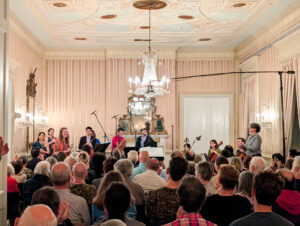
As finale, and in diptych with Griffin’s Cathedral, Claude Vivier’s Zipangu was an impressive stroke. Interspersed between these two larger works for string orchestra was another short, innocuous piece from Charlies Ives: his Hymn of 1904. One craved more context for this curatorial placement, especially for its juxtaposition with Zipangu.
But Vivier’s vivid, brazen work for strings from 1980 remained an apt and powerful choice. Brimming with a depth of sound we had not yet heard on the program, Zipangu boasted its novel textures as a means of expression, easily engrossing even the most casual listener. Vivier himself claimed, “within the frame of a single melody I explore in this work different aspects of color. I tried to ‘blur’ my harmonic structure through different bowing techniques.”
Glimmers of microtonal Ligeti shone through the spectral haze of this work (*think* 2001: A Space Odyssey). After Griffin’s favoring of low registers, the arrival of Vivier’s upper strings scoring proved a dramatic and welcomed shift.
This branch of string writing is not always easy to interpret nor to refine, especially for a quasi pick-up orchestra. Nevertheless, the sheer impact and boldness of the material seemed to inspire the string players on Thursday, many of whom Griffin described as “Momenta alumni,” having played with the group over the past 20 years.
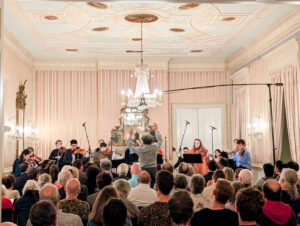
For some time, conductor and artistic director, Sebastian Zubieta, had urged Momenta to program this music by Vivier. On Thursday night, it seemed to augment the quartet’s profile and manifest a compelling wrap-up to the 2024 Festival.
What’s more, the works of Claude Vivier are worthy of wider recognition, 41 years on from his death. Thanks to Momenta and their colleagues this relevant, near-cosmic, Canadian voice reached our sympathetic ears on Thursday night, straight on through the hurly-burly “blur” of a 21st century that Charles Ives would have almost certainly recognized.
